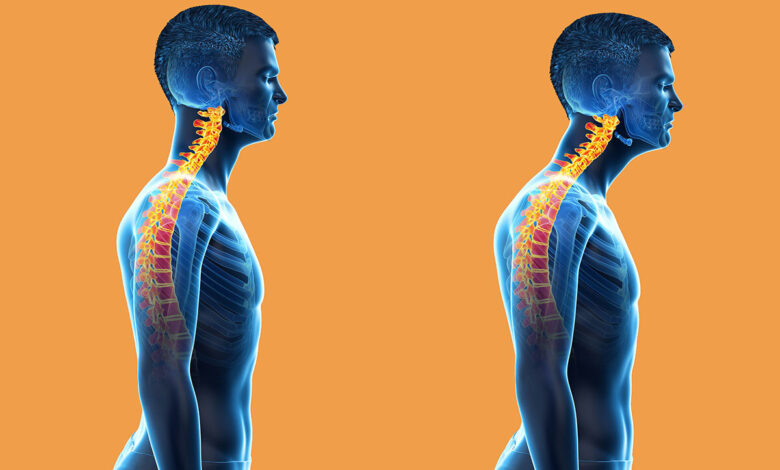The Best Ways to Fix Forward Head Posture (Nerd Neck)

Modern culture has more neck pain for different reasons. Sitting at computers or bent over electronics all day causes bad posture and neck muscular tension. Stress and psychological stress can also cause neck and shoulder pain and muscular stiffness. Smartphone and laptop usage often causes abnormal neck postures, increasing this condition. Lack of physical activity and poor workplace design also contribute to pain in the neck. Lifestyle and technology changes have made neck discomfort a prevalent complaint in today’s culture.
What is Nerd Neck?
According to the “nerd neck” condition, people who spend a lot of time at their workstations or using portable electronics like computers, cellphones, and iPads gain bad posture with a forward head position and rounded shoulders. This position can strain neck and upper back muscles, ligaments, and vertebrae, causing discomfort, stiffness, and long-term concerns like persistent neck and back pain, migraines, and spine structural alterations.
Since “nerd neck” implies that those who engage in sedentary intellectual or technological activities are more likely to have the ailment, it may be stigmatizing. No matter their interests or career, anyone who spends a lot of time in neck- and back-straining positions can develop poor posture.
Risk Factors
Several risk factors cause “nerd neck” or improper posture:
Overuse of cellphones, tablets, and computers can lead to forward head posture and rounded shoulders, especially if not properly positioned. Lack of exercise weakens posture-supporting muscles, making it harder to maintain normal alignment. Weak neck, upper back, and shoulder muscles, together with chest and front shoulder tension, can cause bad posture and a nerdy neck.
Distorted desks, seats, and computers can increase neck and back pain. Mental or physical stress can put strain on the neck and shoulder muscles, causing bad posture and discomfort. Too much weight strains the vertebral column and muscles, making posture harder. Muscle endurance, mobility, and bone density can alter with age, affecting posture and increasing the risk of neck and back disorders.
Genetic factors, such as spine deviations or connective tissue illnesses, can predispose some individuals to postural difficulties. Previous neck, back, or shoulder injuries can impair posture and increase overall neck risk. Lifestyle changes, ergonomic adaptations, and focused exercises can lower the risk of bad posture and a nerdy neck.
5 Ways to Combat Nerd Neck
To avoid “nerd neck” and head or backache and discomfort, practice good posture. Five strategies to fight nerdy neck and pain management in Dallas are:
1- Workstation Ergonomics
Support proper posture with an ergonomic workspace. Ensure that your computer monitor is at eye level, your chair provides back support, and you have positioned the mouse and keyboard to allow your arms to rest at both sides, with your elbows bent at 90 degrees. Adjust your chair level to rest your feet on the floor or footrest.
2- Take Small Breaks
Break up long periods of sitting or screen time. Set a timer to stand, stretch, and walk every 30–60 minutes. During breaks, basic neck, shoulder, and back stretches can reduce tension and improve circulation.
3- Tighten And Stretch Muscles
Exercise your head, upper back, and shoulders to strengthen and stretch them. Chin tucks, shoulder blade squeezes, chest stretches, and neck rotations. Swimming, yoga, and Pilates can improve posture and minimize nerd-neck risk.
4- Awareness Of Posture
Watch your posture while sitting, standing, and walking. Practice keeping your shoulders down, your chin facing down, and your spine neutral. Consider envisioning a thread pulling your head to the sky or strengthening your core muscles to support your spine and fix your posture.
5- Use Of Ergonomic Seats
Ergonomic seats, standing workstations, laptop stands, and posture correctors can improve posture. These products can alleviate neck and back pain and make daily alignment easier. Make use of firm pillows to avoid back and neck pain.
By using these methods daily and by consulting a neck pain doctor in Dallas, you can prevent nerdy necks and improve posture and spinal health.
What are the Side Effects of Nerd Neck?
Poor posture, or “nerd neck,” can harm both your mental and physical well-being over time. Side effects and problems may include:
- Nerd necks often cause cervical and upper back discomfort. Poor posture stresses neck or upper back ligaments, muscles, and joints, causing stiffness and discomfort.
- Prolonged bad posture can cause shoulder and neck muscle pain, as well as stress headaches. Ned’s forward head posture can also strain the cervical vertebrae and cause headaches.
- Keeping a forward head position and rounded shoulders might reduce neck and shoulder range of motion over time. This reduced movement can make daily duties harder.
- Bad posture can cause hyperactive and tight muscles and weak, unused muscles. Poor posture and injury risk might worsen with these imbalances.
- Displacement of nerves in the upper back and neck owing to improper posture can cause arm and hand tingling, numbness, and weakness. This compression may cause syndrome of the thoracic outlet or cervical radiculopathy.
- Chronic bad posture can hasten disc degeneration, spinal misalignment, and osteoarthritis. Chronic pain and spinal instability may result from these changes.
- Having a forward head might compress the chest cavity and limit lung expansion. Fatigue and energy loss can result from shallow respiration and decreased oxygen intake.
- Poor posture affects how others and you see yourself. Slouching can affect self-esteem and social connections.
- Chronic neck pain might affect mood and mental health. Pain can cause impatience, annoyance, and worry, affecting the quality of life.
- Indigestion, reflux of acid, and constipation can result from poor posture compressing the digestive organs.
- To avoid chronic or severe adverse effects, geek necks and poor posture must be addressed early. Ergonomic changes, regular mobility, strength and flexibility workouts, and mindfulness can all help to improve posture and spinal health. If you’re in pain, see a neck pain doctor in Dallas or a physiotherapist for personalized treatment.
Conclusion
Nerd necks and incorrect posture must be addressed for spinal health and well-being. Ergonomic changes, regular exercise, and awareness can relieve discomfort and prevent long-term issues like neck and back pain, restricted flexibility in motion, and compression of the nerves. Preventive spinal health interventions promote physical comfort, trust, mood, and standard of living. Poor posture can be mitigated, and a healthier, more pleasant lifestyle can be achieved with persistent effort and awareness. For pain management in Dallas, always consult with your doctor first.



